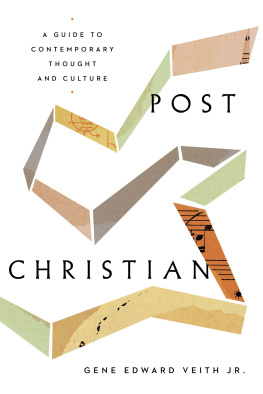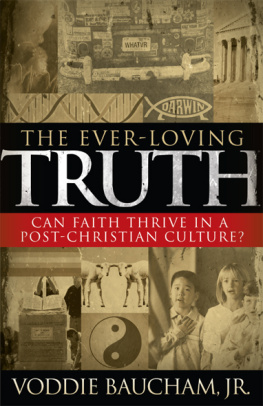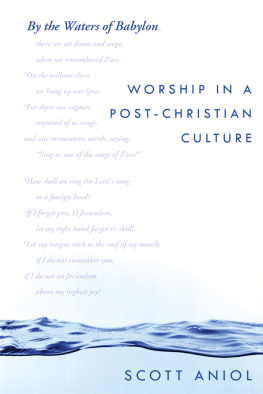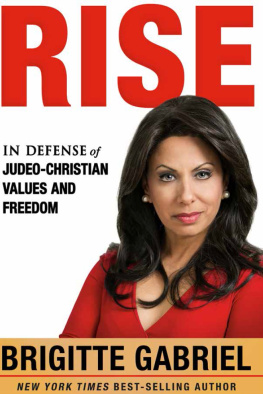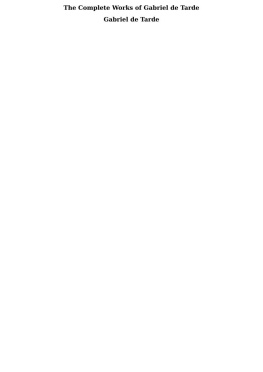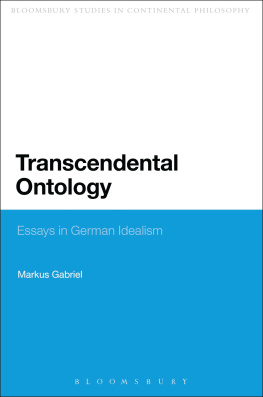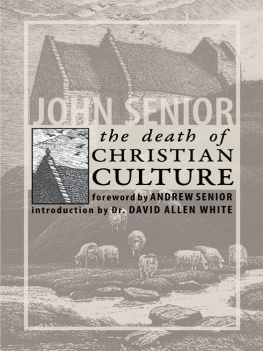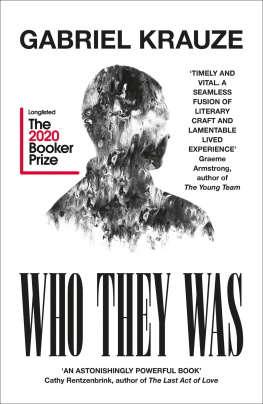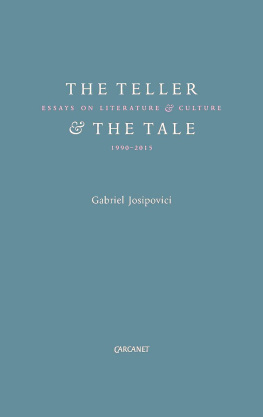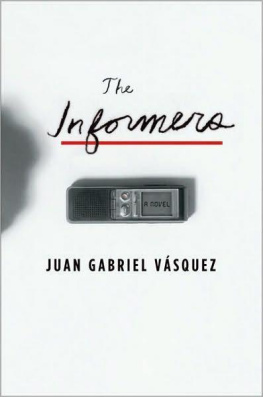Gabriel Vahanian - The Death of God: The Culture of Our Post-Christian Era
Here you can read online Gabriel Vahanian - The Death of God: The Culture of Our Post-Christian Era full text of the book (entire story) in english for free. Download pdf and epub, get meaning, cover and reviews about this ebook. year: 2009, publisher: Wipf and Stock, genre: Religion. Description of the work, (preface) as well as reviews are available. Best literature library LitArk.com created for fans of good reading and offers a wide selection of genres:
Romance novel
Science fiction
Adventure
Detective
Science
History
Home and family
Prose
Art
Politics
Computer
Non-fiction
Religion
Business
Children
Humor
Choose a favorite category and find really read worthwhile books. Enjoy immersion in the world of imagination, feel the emotions of the characters or learn something new for yourself, make an fascinating discovery.
- Book:The Death of God: The Culture of Our Post-Christian Era
- Author:
- Publisher:Wipf and Stock
- Genre:
- Year:2009
- Rating:4 / 5
- Favourites:Add to favourites
- Your mark:
- 80
- 1
- 2
- 3
- 4
- 5
The Death of God: The Culture of Our Post-Christian Era: summary, description and annotation
We offer to read an annotation, description, summary or preface (depends on what the author of the book "The Death of God: The Culture of Our Post-Christian Era" wrote himself). If you haven't found the necessary information about the book — write in the comments, we will try to find it.
The Death of God: The Culture of Our Post-Christian Era — read online for free the complete book (whole text) full work
Below is the text of the book, divided by pages. System saving the place of the last page read, allows you to conveniently read the book "The Death of God: The Culture of Our Post-Christian Era" online for free, without having to search again every time where you left off. Put a bookmark, and you can go to the page where you finished reading at any time.
Font size:
Interval:
Bookmark:

This edition is published by Muriwai Books www.pp-publishing.com
To join our mailing list for new titles or for issues with our books muriwaibooks@gmail.com
Or on Facebook
Text originally published in 1961 under the same title.
Muriwai Books 2018, all rights reserved. No part of this publication may be reproduced, stored in a retrieval system or transmitted by any means, electrical, mechanical or otherwise without the written permission of the copyright holder.
Publishers Note
Although in most cases we have retained the Authors original spelling and grammar to authentically reproduce the work of the Author and the original intent of such material, some additional notes and clarifications have been added for the modern readers benefit.
We have also made every effort to include all maps and illustrations of the original edition the limitations of formatting do not allow of including larger maps, we will upload as many of these maps as possible.
DEDICATION
A MA FAMILLE
dans laffection o nous lie
la mmoire de Nolle
ACKNOWLEDGMENTS
I WISH to take this opportunity to thank all those whosince I borrow or quote from their workshave influenced and shaped my thinking in a manner obvious to the reader: my hope is that this indebtedness to those I cite and sometimes forget to cite is not devious. I also wish to thank those who guided me in the years of my intellectual formation, in particular the late Professor Pierre Maury and Professor Paul Lehmann. My debt to them continues even though fellow students would agree with me that this book is hardly an adequate expression either of what we were taught or of my gratitude.
I am also indebted beyond measure to Professor Paul Ramsey for his painstaking reading of the manuscript and his careful suggestions. I must, however, assume the responsibility for the statements made in this work. Mrs. Marian Maury has rendered me the invaluable service of intelligently editing the final draft.
I have incorporated into this book the following material which has appeared elsewhere. I have reproduced almost in its entirety This Post-Christian Era (The Nation, December 12, 1959) and quoted from the following: The God We Deserve (The Nation, February 20, 1960); The Great Whatever (The Nation, March 7, 1959); Plea for a New Reformation (The Nation, April 16, 1960); The Empty Cradle (Theology Today, January, 1957). I gladly record here my thanks to the respective publishers of these magazines for permission to make use again of these articles.
When Zarathustra was alone he said to his heart: Could it be possible! This old saint in the forest hath not yet heard of it, that God is dead!THUS SPAKE ZARATHUSTRA, Friedrich Nietzsche
To kill God is to become god oneself; it is to realize already on this earth the eternal life of which the Gospel speaks.TELE MYTH OF SISYPHUS, Albert Camus
The god that can be pointed out is an idol, and the religiosity that makes an outward show is an imperfect form of religiosity.CONCLUDING UNSCIENTIFIC POSTSCRIPT, Sren Kierkegaard
The most dreadful sort of blasphemy is that of which Christendom is guilty: transforming the God of Spirit into...ludicrous twaddle. And the stupidest divine worship, more stupid than anything that is or was to be found in paganism, more stupid than worshiping a stone, an ox, an insect, more stupid than all that isto worship under the name of God...a twaddler.ATTACK UPON CHRISTENDOM, Sren Kierkegaard
PREFACE
OURS is the first attempt in recorded history to build a culture upon the premise that God is dead. The period post mortem Dei divides into two distinct eras, roughly at some point between the World Wars. Until that time, the cultural death of God meant something anti-Christian; after it and until now, the death of God means something entirely post-Christian. The author of this book writes mainly about the latter, and this is his distinct contribution to the analysis of present-day culture. This preface undertakes to speak mainly of the former as background for an understanding of post-Christian culture and the death of God in the second sense.
To speak of the death of God in its anti-Christian meaning is to invoke at once the name of Friedrich Nietzsche, that great genius in pain finally made mad by his perception into the inner meaning of Western culture. With him, still, we have to ask about the death of God.
There are several stages in the myth Nietzsche tells of why and how God died. First, the many gods had to go. Theirs was not a doleful passing, although what followed was worse. The old deities did not begloom themselves to death. Rather, a good joyful Deity-end had they! They laughed themselves to death once on a time! This happened when the ungodliest utterance came from a God himselfwhen an old grim-beard of a God, a jealous one, forgot himself in such a wise as to say: There is but one God! Thou shalt have no other Gods before me! Then all the Gods laughed, and shook upon their thrones. They exclaimed, Is it not just divinity that there are Gods but no God? and then they expired from god-shattering laughter such as only a god can enjoy.{1}
The God that remained, according to Nietzsche, had never as much life as they. He could neither laugh nor dance. Obeisance to Him was bound to be culture-destroying; His, the spirit of gravity. The old classical deities had at least the energy bestowed on them by the fact that each was closely identified with the nisus of some human need or with some force in nature. The one God was, after all, only a conjecture. Moreover, the rub was that, as a transcendent God, he was a conjecture that reached beyond mans creating will. This Nietzsche wished to estop, in order to liberate the cultural creativity of mankind. I do not wish your conjecturing to reach beyond your creating will, he wrote.{2} After the gods made in mans image, the God who proposed to make and remake man in his own image, that God too had to die.
That is a more unsavory tale to tell. He was too much God-with-us, God in human, all-too-human form. He mixed too much in human affairs, even manifesting himself in this miserable flesh. In a sense, Gods fellow-humanity killed him. Such a God must be wholly done to death, Nietzsche believed, else man as he now is would be certified from on high.
Man in his misery and weakness had a hand in this. Such was Nietzsches vision of the ugliest man, the epitome of all that should not receive divine endorsement but should be surpassed, something sitting by the wayside shaped like a man, and hardly like a man, something nondescript. Gods all-too-human pity and very un-Godlike demeanor was an offense to modesty. Therefore he had to be slain.
...hehad to die: he looked with eyes which beheld everything,he beheld mans depths and dregs, all his hidden ignominy and ugliness.
His pity knew no modesty: he crept into my dirtiest corners. This most prying, over-intrusive, over-pitiful one had to die.
He ever beheld me: on such a witness I would have revengeor not live myself.
The God who beheld everything, and also man: that God had to die! Man cannot endure that such a witness should live.{3}
Man could not endure the God who beheld him through and through. So man took revenge on this witness,{4} and became the murderer of the God who set and besets him in his existence, and does not turn away his eyes or refrain from knowing it altogether.
Nietzsches portrayal of the one atheist who has complete certitude that God is dead was of the last Pope, now out of service. He served that old God until his last hour. He was, so to speak, at the bedside when God breathed his last. Yet even he is not free from the gravity of pious recollections. This may be taken as a symbol of the modern religiosity, Protestant and Catholic, analyzed so well by the author of the present volumea religiosity unable quite to forget that God once lived, yet unable to face this modern world and live freely within its culture without attempting to impose extrinsic limits or so-called religious interpretations upon the cultural products of men.
Font size:
Interval:
Bookmark:
Similar books «The Death of God: The Culture of Our Post-Christian Era»
Look at similar books to The Death of God: The Culture of Our Post-Christian Era. We have selected literature similar in name and meaning in the hope of providing readers with more options to find new, interesting, not yet read works.
Discussion, reviews of the book The Death of God: The Culture of Our Post-Christian Era and just readers' own opinions. Leave your comments, write what you think about the work, its meaning or the main characters. Specify what exactly you liked and what you didn't like, and why you think so.


